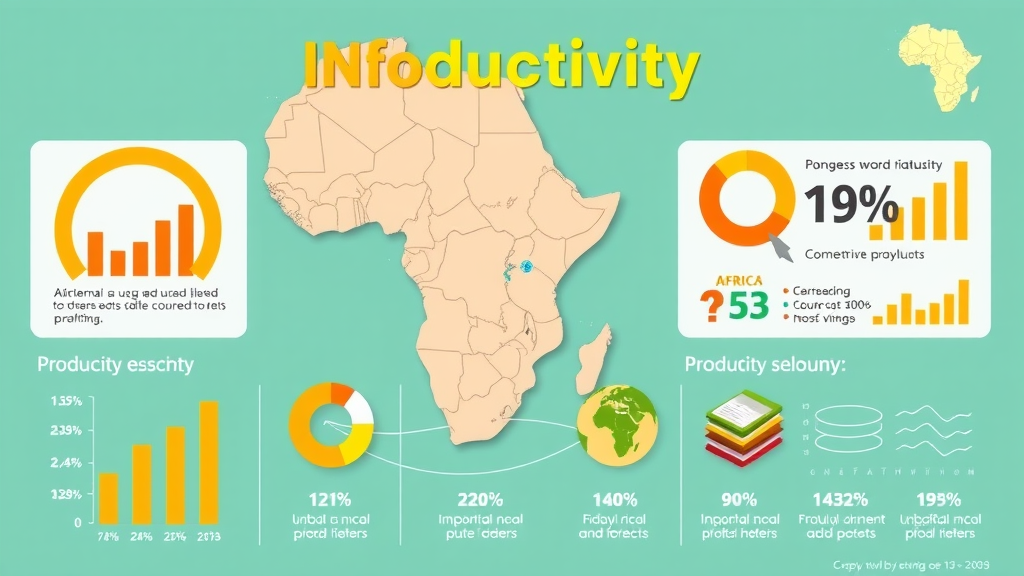Startlingly, Africa's productivity growth has plummeted from 2.2% annually (2000-2010) to just 0.8% over the last decade. This decline paints a concerning picture of the continent's economic stagnation and underlines the urgent need for transformative solutions. In this article, we will explore the factors affecting productivity in Africa as we delve into various dimensions of this pivotal issue.

Overview of Productivity in Africa
According to Acha Leke, Senior Partner at McKinsey & Company, productivity in Africa represents a significant challenge affecting economic growth across multiple sectors including agriculture, manufacturing, and services. This comprehensive analysis reveals that the continent is either the least productive or amongst the least productive regions globally. Such workforce inefficiencies contribute to the grim statistics: 60% of the population currently lives in poverty, with predictions foreseeing an even larger segment of the population experiencing economic hardship unless productivity is enhanced.
These insights raise critical questions about the key factors affecting productivity in Africa and underline the necessity for vigorous discussion and innovative strategies.
Current State of Productivity Growth
Africa's productivity growth rates are alarming. Since 1990, real GDP per capita has seen barely a 1.1% increase annually, starkly highlighting the stagnation that grips much of the continent. Considering that projections indicate that by 2030, Africans will account for over 80% of the world’s impoverished, addressing these productivity challenges is not just an economic concern but a pressing humanitarian imperative.
Key Factors Affecting Productivity in Africa
Low Labor Productivity

One of the most prominent factors affecting productivity in Africa is the notably low labor productivity. Various industries—ranging from agriculture to manufacturing—exhibit ineffective labor performance. Leke emphasizes that without addressing these productivity deficits, economic advancement across sectors will remain a daunting challenge. Enhancing labor productivity is critical, necessitating investments in training and technology to equip workers with the skills needed to thrive.
Structural Changes in the Economy
Another significant issue is the structural changes within the economy. Many African nations are transitioning from agrarian-based economies to industrial and service-oriented ones. However, this shift often lacks sufficient alignment with workforce skills or available technology, which further exacerbates the productivity crisis. Engaging in comprehensive economic reforms and strategizing around sector transitions could advance productivity outcomes. For instance, the DRC Port Project by DP World and Mota-Engil aims to revolutionize trade routes, potentially boosting productivity through improved infrastructure.
Total Factor Productivity
Total Factor Productivity (TFP) reflects not just labor input but also efficiencies across the broader economic landscape. Poor infrastructure, inconsistent government policies, and limited access to capital significantly hinder TFP in Africa. Therefore, improving these foundational aspects holds promise for accelerating overall economic performance and productivity across the continent. The challenges faced by Kenyan businesses due to rising costs highlight the need for strategic economic reforms to enhance productivity.
The Role of Digital Technology in Boosting Productivity

The advent of digital technology represents a transformative opportunity for enhancing productivity in Africa. According to Acha Leke, embracing digital solutions can catalyze improvements across various sectors. The influence of digital platforms in financial services is already being felt, with Africa holding 60% of the world's mobile banking accounts. As digital penetration increases, there is potential for broader economic enhancements.
Digital Transformation in Financial Services
Digital innovations have already proven beneficial by reducing inefficiencies in financial transactions. The proliferation of mobile payments and FinTech solutions facilitates financial inclusivity, which is vital for entrepreneurship and economic growth in the region.
Digitization of Government Services
In nations like Togo, digitalization of government services has yielded impressive outcomes, improving revenue generation significantly. Efficient service provision through digital means can enhance governmental operations and economic activities.
Enhancing Agricultural Productivity through Technology
Technological advancements have ushered in a new era of agricultural productivity. Using data analytics and mobile applications, farmers can monitor crops, manage resources better, and significantly reduce post-harvest losses, thereby contributing to food security and economic stability.
Expert Insights on Productivity Challenges
Acha Leke, Senior Partner at McKinsey & Company, states, "Productivity across the board is incredibly low [in Africa]."
This candid observation from Leke lays bare the fundamental challenges organizations and governments must address to unlock Africa’s economic potential. Understanding these productivity challenges is essential for stakeholders aiming to initiate change.
Common Misconceptions about Productivity in Africa

Common misconceptions often cloud the reality of productivity issues in Africa. Many believe productivity challenges are solely linked to unskilled labor; however, systemic issues such as inadequate infrastructure, lack of investment, and inconsistent governmental policies can be equally impactful. A clear, nuanced understanding of the factors affecting productivity is vital for developing effective solutions.
Actionable Strategies for Improving Productivity
Investing in Education and Skills Development

Investing in education and skills development is preeminent among the strategies to enhance productivity in Africa. By equipping workers with the relevant skills, countries can significantly elevate labor productivity and foster a more adaptive workforce ready to meet the demands of a global economy.
Encouraging Private Sector Innovation
Beyond investment in skills, fostering a climate that encourages private sector innovation can stimulate economic growth. Governments should create policies that promote entrepreneurship, enabling businesses to innovate and thrive within the marketplace.
Leveraging International Partnerships
International partnerships can prove a vital resource in addressing productivity deficits. By collaborating with global firms, African nations can gain access to technology, expertise, and markets that propel economic development. The future of African airports as shaped by Davcon Aviation exemplifies how international collaboration can enhance infrastructure and productivity.
People Also Ask
What causes low productivity in Africa?
Low productivity in Africa is primarily driven by factors such as inadequate infrastructure, lack of investment in education, and structural challenges in the economy.
What are the factors of production in Africa?
The primary factors of production in Africa include land, labor, capital, and entrepreneurship, with significant room for improvement in efficiency across these areas.
What are the main factors affecting productivity?
Key factors affecting productivity in Africa can be summarized as low labor productivity, structural economic changes, and total factor productivity.
What is the productivity of Africa?
Productivity in Africa is alarmingly low, reflecting extensive inefficiencies in multiple sectors compared to global standards.
Conclusion

Addressing the factors affecting productivity in Africa is crucial for unlocking economic potential and alleviating poverty. As Acha Leke points out, leveraging digital technology and investing in skills development can provide transformative solutions that shape Africa's future. The potential is vast, and with the right strategies, Africa can emerge as a stronger contributor to the global economy.
Discover Afridigest

Afridigest is committed to becoming the most valuable platform for African entrepreneurs, providing insightful ideas, analyses, and resources to drive growth and innovation across the continent. Subscribe to stay updated on the latest insights.




 Add Row
Add Row  Add
Add 




Write A Comment